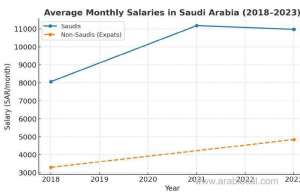In a recent interview on the Thamanya talk show, Mohammed Al-Jadaan, the Minister of Finance in Saudi Arabia, discussed the government's reconsideration of expatriate dependent fees. This strategic move aims to enhance the influx of new talent into the Saudi market, signaling a shift in economic policy.
The dependent fee, initially introduced in July 2017 at 100 riyals per dependent per month, steadily increased to 400 riyals per dependent per month by 2020. Al-Jadaan highlighted the positive impact of this fee, citing its role in curbing excessive spending in the economy and promoting expatriate retention within the Kingdom.
However, the rationale behind imposing such fees is multi-faceted. Al-Jadaan explained that the government's decision stems from the need to balance the provision of free or subsidized services, such as gas, electricity, water, medical care, security, and infrastructure maintenance. With over two million individuals benefiting from these services, the government deemed it appropriate for dependents to contribute financially.
Moreover, Al-Jadaan emphasized the importance of periodically reassessing such policies to ensure their alignment with broader economic objectives. As Saudi Arabia endeavors to attract and retain talent amidst evolving market dynamics, the government remains open to revisiting its decisions regarding dependent fees.
The discussion also touched upon the controversial issue of value-added tax (VAT) and the challenges associated with its implementation. Al-Jadaan acknowledged concerns regarding the regressive nature of VAT, particularly its disproportionate impact on lower-income segments. However, he underscored the necessity of harmonizing fiscal policies within the Gulf Cooperation Council (GCC) to foster regional economic integration.
Furthermore, Al-Jadaan highlighted the complexities involved in introducing income tax, citing the need for comprehensive research to weigh its economic implications. While acknowledging the inherent imperfections in taxation systems, he reiterated the government's commitment to mitigating adverse effects through targeted reforms, such as the Citizen's Account initiative.
In conclusion, Al-Jadaan reiterated the government's proactive approach to economic policymaking, driven by a commitment to fostering sustainable growth and equitable development. By engaging in ongoing dialogue and evidence-based decision-making, Saudi Arabia aims to navigate the complexities of fiscal reform while maximizing benefits for its citizens and residents alike.




